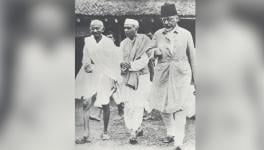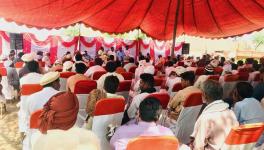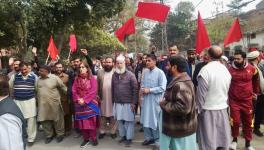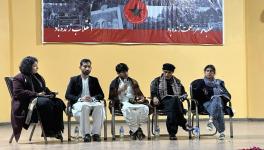Pakistan Stirs up Pashtun Hornet’s Nest
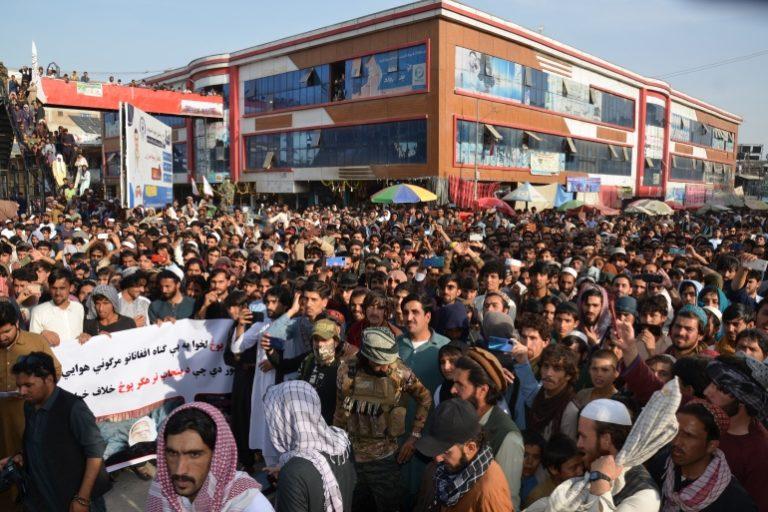
Afghans protest against Pakistani air strikes, Khost, April 16, 2022
The Pakistani air strikes on Saturday on the eastern Afghanistan provinces of Kunar and Khost killing dozens of people may seem at first glance a crude knee-jerk reaction to the ambush in North Waziristan the previous day in which seven Pakistani soldiers were killed. But there is some deliberateness in what happened.
Pakistani military leadership would know that such wanton killing of civilians would gain nothing tangible while it has the potential to play out at unforeseen levels. Certainly, the good part is that neither Washington nor any regional capital — or the new prime minister in Islamabad — voiced any disapproval.
But, predictably, the Taliban interim government strongly reacted. This is indeed a humiliating rebuff to the Taliban by its erstwhile mentors. The halo of having defeated a superpower dissipates when it transpires that the Taliban government is incapable of defending its citizens against an external attack.
This is a setback to the Taliban government’s campaign seeking international recognition. Things were going rather well of late with Russia joining some other regional states in granting accreditation to a Taliban nominee to head the Afghan missions in their capitals — a shade lower than formal recognition but de facto recognition, nonetheless.
Equally, the momentum created by the recent meeting of the Foreign Ministers of Afghanistan’s neighbouring countries in Tunxi, China, has suffered a setback. Ironically, China worked hard to generate such momentum. And, against the backdrop of the Ukraine crisis, Russia was fully on board to assert that the regional states should keep the initiative on navigating a pathway for the Taliban government.
State Councillor and Foreign Minister Wang Yi paid a visit to Kabul in this connection. But now it transpires that Beijing’s Iron Brother has nullified all that with a single stroke. Beijing is keeping mum about the Pakistani attacks on Saturday, which constitute a flagrant violation of Afghanistan’s sovereignty and territorial integrity.
This last part is important because one consistent principle Beijing has espoused is to help Afghanistan defend its sovereignty and territorial integrity. In fact, as recently as on March 31, Chinese President Xi Jinping in a special message to the top diplomats of Afghanistan’s neighbouring countries underscored that Afghanistan has come to “a critical point of transition from chaos to order.” He said:
“Afghanistan is a common neighbour and partner of all participating countries, and we form a community with a shared future linked by the same mountains and rivers who would rise and fall together… China always respects Afghanistan’s sovereignty, independence and territorial integrity, and has committed to supporting its pursuit of peace, stability and development.”
Beijing, of course, took such high ground with an eye on the US. Now, the Pakistani attacks set a precedent. Now onward, indeed, what prevents the US from undertaking military operations in Afghanistan? It didn’t occur to Bajwa that Afghanistan is struggling to regain its sovereignty and a jab at this point can wound lethally.
But then, there is no question that Bajwa coolly assessed that Washington would be empathetic toward his disciplining of the Taliban. In fact, with this single act, he demonstrated that the Pakistani military has no longer any emotional hang-ups about the Taliban, no matter their past symbiotic relationship through decades.
Arguably, Pakistan is edging closer to the Western camp even as the regional states led by China and Russia have been eroding the Western exceptionalism and constructively engaging the Taliban in a robust regional process. (By the way, the White House decided to dissociate at the last minute from the joint statement of China, Russia and Pakistan at the recent meeting of the so-called Extended Troika at Tunxi.)
This is a high-stakes game, since Wang Yi has formally proposed to the Taliban government leadership in Kabul on extending the China-Pakistan Economic Corridor to Afghanistan and Acting Deputy Prime Minister Mullah Abdul Ghani Baradar actually welcomed the idea.
In retrospect, it was Bajwa’s removal of Lt. Gen. Faiz Hameed as ISI chief last October (overcoming former Prime Minister Imran Khan’s resistance) that proved to be the defining moment in the reset of equations between the GHQ in Rawalpindi and the Taliban. Hameed had enjoyed a good rapport with the Taliban leadership and their trust. Succinctly put, the Taliban accurately sensed the weighty compulsions behind Bajwa’s stubbornness — personal, political and geopolitical — to replace Hameed as ISI chief even by risking a standoff with Imran Khan.
Since Hameed’s replacement, things were never the same again between the Taliban and Rawalpindi. As Imran Khan’s influence began waning, Taliban who is clued in on the Byzantine politics of Pakistan, drew appropriate conclusions. Taliban’s overtures to the European powers, US, India, etc. can now be better understood. The Afghans instinctively seek to balance Pakistani pressures. But in this case, Taliban miscalculated, since Bajwa is so much more useful for Washington — in the immediate term, at least.
The Afghan opinion across the board has condemned the Pakistani attacks, including the Taliban’s bête noire known as the National Resistance Front (NRF). That said, however, the NRF (who form the anti-Taliban resistance groups drawn largely from the security establishment of the ancien régime in Kabul) also takes a swipe at the Taliban.
While strongly condemning the Pakistani attacks, the NRF statement also says, “Condemning this aggression and the blind attacks by Pakistani forces, we consider the Taliban occupying regime the main cause of foreign aggression in Afghanistan. We emphasise the dismantling of the occupiers and proxy groups in Afghanistan.”
The estrangement between Pakistani military and the Taliban puts the NRF in a dilemma, since its main plank is that the Taliban is a mere proxy of the ISI with an agenda to project Pakistani power into Afghanistan. That plank is coming unstuck just when the NRF is reportedly gearing up to launch its guerilla war in Afghanistan from its bases in Tajikistan.
The Foreign Policy magazine affiliated to the Washington Post recently reported that the guerrilla war is set to be launched in summer. Russian reports also mention that Western envoys have been quietly visiting Tajikistan to tie up loose ends. The paradox is that Bajwa and NRF leader Abdullah Saleh have now become bedfellows enjoying US patronage!
Yet, Bajwa’s decision is risky no matter the grandstanding. Hopefully, Bajwa refrains from taking the next logical step which will be to split the Taliban — something that will please the Americans. But he is poking Pashtun ethno-nationalism. This is highly sensitive at a juncture when the Pakistani power calculus itself is so heavily dominated by the Punjabi elites. The huge groundswell of support for Imran Khan among Pashtuns is self-evident from the size of the protest rallies in Peshawar and Karachi.
For the foreseeable future, Taliban would also have its uses for ethno-nationalism, given its inability or unwillingness to share power and form an “inclusive” government. In all likelihood, this will manifest as greater radicalisation and militancy of the Tehrik-i-Taliban Pakistan (Pakistani Taliban). The Afghan Taliban will be hamstrung even if it wants to rein in the TTP in these emergent circumstances following the regime change in Pakistan with American backing.
Get the latest reports & analysis with people's perspective on Protests, movements & deep analytical videos, discussions of the current affairs in your Telegram app. Subscribe to NewsClick's Telegram channel & get Real-Time updates on stories, as they get published on our website.











